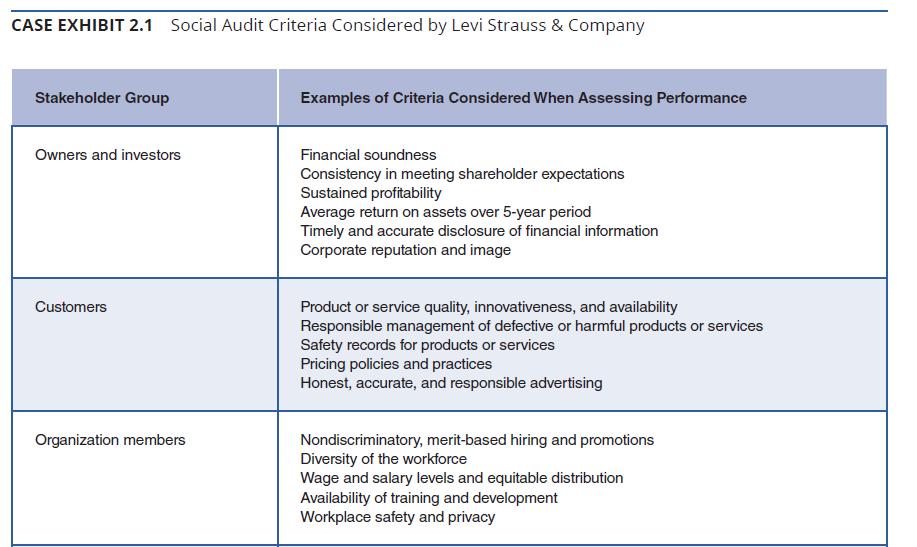In 1872, Levi Strauss received a letter from Jacob Davis, a Nevada tailor who had been buying
Question:
In 1872, Levi Strauss received a letter from Jacob Davis, a Nevada tailor who had been buying bolts of fabric from Strauss’s dry goods company. Davis wrote to explain how he used metal rivets to strengthen the construction of the overalls he made. Because Davis couldn’t afford to file for a patent, he invited Strauss to become a partner. Strauss knew a good idea when he saw it, and the two were granted the patent in 1873.
Today, Levi Strauss & Company is still privately owned, and the company’s approach to ethical management is as familiar to business leaders as its jeans are to teenagers. Its mission statement begins, “The mission of Levi Strauss & Co. is to sustain responsible commercial success as a global marketing company of branded apparel.” Its Aspiration Statement goes on to say, “We all want a company people can be proud of,” which includes “leadership that epitomizes the stated standards of ethical behavior.” At Levi Strauss, ethical leadership extends well beyond company walls to its dealings with some cutting, sewing, and finishing contractors in more than 100 countries. Despite cultural differences in what is viewed as ethical or as common business practices, the company seeks business partners “who aspire as individuals and in the conduct of all their businesses” to ethical standards compatible with those of Levi Strauss. In addition to legal compliance, the company will do business only with partners who share a commitment to the environment and who conduct their business in a manner consistent with its own Environmental Philosophy and Guiding Principles. In the area of employment, partners must pay prevailing wage rates, require less than a 60-hour week, not use workers under age 14 and not younger than the compulsory age to be in school, not use prison labor, and not use corporal punishment or other forms of coercion. Levi Strauss regularly conducts contractor evaluations to ensure compliance. It helps companies develop ethical solutions when noncompliance is discovered.
Closer to home, Levi Strauss actively promotes ethical business practices through activities such as membership in Business for Social Responsibility, an alliance of companies that share their successful strategies and practices through educational programs and materials. The company’s domestic employment policies are also known for being ahead of the times. For example, during the 1950s, they were pioneers in integrating factories in the South. In the 1990s, they were among the first companies to offer insurance benefits to their employees’
unmarried domestic partners. Through this and other policies, the company has taken a strong stance in favor of the diversity that employees bring to the workplace. That said, Levi Strauss faces a very competitive environment that requires continuous adjustments. Levi Strauss, nevertheless, retains a prominent image in the minds of shoppers worldwide.
To assess how well the company adheres to its values, the company conducts a social audit.
Some of the criteria they evaluate the company against are shown in Case Exhibit 2.1.88 To learn more about the company’s current activities, its values, vision, and transformation, visit the home page at www.levistrauss.com.

CASE QUESTIONS
1. Knowing that its managers are willing to trade off some economic efficiency to operate according to their collective view of what is “ethical,” would you buy shares of stock in this company? Why or why not?
2. Managers at Levi Strauss believe that they run an ethical company, but some critics view their liberal employment and benefits policies as immoral. These critics object to the policies because they’re inconsistent with the critics’ religious views. Analyze the pros and cons of an organizational culture that includes socially liberal employment policies that are viewed by some members of society (including potential employees and potential customers) as immoral.
3. Suppose you are looking for a new job. You have two offers for similar positions: one at Nike and one at Levi Strauss. Both organizations have indicated that they would like you to work for a year in one of their offshore production plants somewhere in Southeast Asia. The two salary offers are very similar, and in both companies you would be eligible for an annual bonus. The bonus would be based largely on the productivity of the production plant where you will be located. Which offer would you accept? Explain why.
4. In the mid-1990s, sales began declining and the company had to move many operations abroad, dramatically reducing its U.S. workforce. Levis Strauss is now a global company with three major divisions around the world (visit www.levistrauss.com).
Do you think what has happened at Levis Strauss is likely to happen with more U.S. companies? What are the implications of this for you?
Step by Step Answer:

Managing Human Resources
ISBN: 978-8522104291
12th Edition
Authors: Susan E Jackson, Randall S Schuler, Steve Werner





